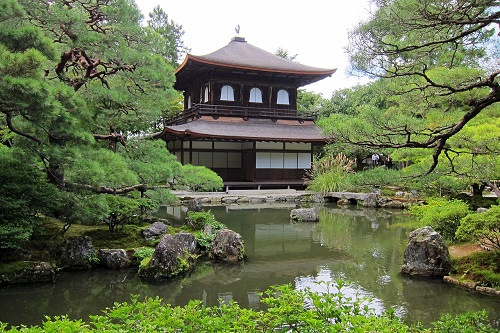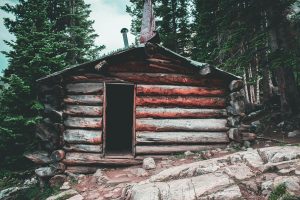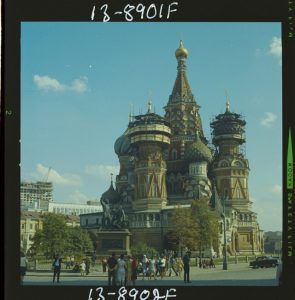by Helga Hewston
“Being the richest man in the cemetery doesn’t matter to me. Going to bed at night saying we’ve done something wonderful—that’s what matters to me.”
—Steve Jobs
The Wall Street Journal, May 25, 1993
November 2017
The ghost of Steve Jobs liked to hang out in Kyoto. In particular, he enjoyed haunting the shrines and temples which dotted the Philosopher’s Trail, a two-kilometre stone path renowned for its beauty and abundance of cherry trees. Steve while alive, used to tell people: “There’s something magical about these holy places at prayer time.” If it rained during prayers, all the better. When this happened, he would perch on the turret of his favorite temple to watch the first raindrops beat down upon its worn courtyard tiles, then listen as the gong and the drum announced the monks’ chanting. In harmony with the downpour, the sounds of veneration would hover over the crape myrtle and the maple trees, then rise up towards the temple’s covered stairways, before drifting beyond the hillside pagoda and its panoramic views of the city.
Steve—alive or dead—preferred Kyoto in November when it was still warm and the city’s gardens and walkways were bright with the yellow, red and orange hues of the season. In his younger days and while high on LSD, he described Kyoto’s autumn leaves as dazzling—their colors so vibrant and so intense that they appeared artificial. Later, Steve would say of those mystical experiences: “Honestly, those leaves looked like they had been photoshopped.” Thanks to the drug, his perception of colors and aesthetics, as well as his sense of what was important and meaningful in life, were changed forever.
The ghost of Steve Jobs was constantly philosophizing. He would ask himself questions such as: Am I at peace? What could I have done better? His conclusion was that his death was still too recent and that he needed to pull off a couple more tricks before he could say he had done something wonderful. True, he had pulled off more tricks than the average man in an average lifetime, but Alive Steve had never been happy with average, so even in his ghostly form, he believed there was room for improvement.
November 2011
I am on the Philosopher’s Trail, named in Japanese, the Tetsugaku No Michi. I am moving slowly so I can observe the straggling tourists, who are eager, despite the rain, to capture the path’s unique beauty with cameras or phones. A group of schoolgirls pass by, their uniforms draped with brightly colored backpacks which are low-slung because they are heavy with books. They are prattling gaily beneath pale umbrellas and trees shining with water droplets. They sense me I think, because their chatter ceases when I draw close.
I continue on, and now the rain has stopped. Travelers on the trail are folding up their umbrellas while others are emerging from nearby shops and tearooms. Up ahead, I am aware of a lone gardener picking up fallen and stray leaves with care, and one by one. His attention to detail and absorption in his work, are qualities I respect and admire. In an instant, I am alongside him, leaning over the soft earth and observing the orderly pattern of leaf, grass, twig, soil and insect. In the next instant, I am again at the top of a carved wooden staircase, looking over the eaves of the temple and the tall bamboo striplings beyond the open gates. A few miles away, the Pacific Ocean laps at the shores of Japan, while many thousands of miles to the east, the same ocean washes up on the shores of California, my home, and where my family mourn my recent death.
Distance is no barrier to me now, but while I was alive, the half-day journey across this ocean became a weary pilgrimage to my new spiritual home. In Kyoto, I shall plan my next move; here at my favorite temple, I will find my peace. Let this begin by confronting my father. I have no doubt I shall succeed because what I want is so very little really. But can the dead influence the living? Let’s find out! In my time, I have been labelled a narcissist, a sociopath, and a perfectionist, while some claim I was on the autism spectrum. Certainly, I am stubborn, and it is precisely this trait which keeps me a willing captive, bound to those I love and to those I did not love enough. Such bonds cannot be easily broken or ignored. I understand this more clearly now that I am in spirit form. I wish to be free, yes! But what I really mean is: I wish to stay connected.
Everywhere the old man looks—in newspapers and magazines, on news channels and blogsites, on bookshop shelves and corner billboards, he sees the book entitled Steve Jobs. And on its cover, the famous face of his recently dead son. The book is for sale in its original, printed form, or as an audio version for busy executives and the visually impaired. The book is advertised on TV or radio stations, where its content is discussed endlessly by literary critics, friends of the deceased, enemies of the deceased, colleagues of the deceased—but not yet by the father of the deceased. The book is omnipresent, dominating, and the father is reminded of the sorcerer’s apprentice story from Fantasia, where militant brooms begin their march, multiplying thick and fast, before taking over the screen.
In the old man’s casino world, where reality, along with natural daylight, is deliberately excluded, the book and his son’s story have no obvious place—but still they intrude. Tonight, on his walk through his casino’s main hall, the old man catches two sightings of Steve Jobs and its distinctive white sleeve, and while one of the owners looks down nervously as he passes, the other gestures to a friend and points a lingering finger in his direction, as if it is the father’s face emblazoned on the book cover, and not the son’s.
On most evenings, it gives the old man pleasure to stroll through the casino’s gaming rooms and survey his counterfeit kingdom with its plastic tokens, gaudy fixtures and factory-dyed carpets. The overhead strip-lights cheer him with their artificial glare, and short bursts of sounds coming from the casino fruit machines excite him with their random clinking of coins. With a sweeping and prescient stare, the old man calculates the mood of the evening and weighs up the character and fate of his clients. He knows which guests will demand attention from his staff, which drinks they will order, what kind of recreational drugs they prefer. He can gauge from their clothes, their watches, shoes and accessories and their personal grooming, how much they earn, how much they will spend, and how they will behave if they win or lose. The old man knows all this and is considered an authority by the young trainees, who tease their boss by saying, “Hey, Mr. Jandali, sir, what about that guy over there? What’s his story?” And the old man tells them, and he is rarely wrong.
I regret my decision to not meet my father while I was alive. Now that I am dead, I realize that meeting him would have been the correct thing to do. Technically, we did cross paths, by chance, many years ago, but does that count, as neither of us knew then, that we shared DNA? How was it possible to frequent my father’s Silicon Valley restaurant, greet him, shake his hand, and not realize who he was? But yet, this is precisely what happened. My father and I touched hands but not hearts, and we never met again. I look back on these moments, and go over every cold detail, although I cannot recall my exact words. Maybe it was something like: “Hey, great food!” Or: “Keep the tip.” Ok, it made no difference then, but I am determined to set things right.
I am with my wife and children in our home. I watch them go about their days in shock and grief and I try to let them know of my presence. A rustle of the drapes, a leaf turning in the garden, a sudden click or bleep from the laptops in the study. My picture is everywhere around the house. This reassures me and I feel I am watching over my family. My wife and children seek solace in home videos; they go over our last conversations together and see a deeper meaning in my words than was intended. No matter! But how to let them know I love them?
The hour is late, but the old man is troubled and cannot sleep. There is an odd, rustling noise in the trees outside his window, even though the night air is still and clear. He decides to leave the casino area, with its neon signs and its clatter, and take a short drive into the Sierra Nevada Mountains. He has been raised in a similar mountainous landscape half a world away and now, with the snow-capped peaks towering before him, he looks up at the heavens and is reminded, with pride, that his ancestors named many of the stars which decorate the night sky. Here, Megrez of the Plough’s Ursa Minor constellation and there beyond, the suns Merak, Dubhe and Mizar. Tonight though, the old man’s obsession is focused solely on the Plough’s distinctive wheelbarrow shape, which before his eyes, and for a brief moment, is transformed into the outline of his son’s book. Without having read a single page, the father knows enough of its contents to understand what needs to be done. God help me, it has to be done. Later, when sleep finally reprieves the old man from his fears, he dreams of his childhood home, where he is once again listening to a haunting and familiar voice of the imam, calling the faithful to prayers.
The next morning, he books a flight to Kyoto, and exhausted by his decision, spends the rest of the day in his room, hunched over faded black and white photos from his youth. In the days to follow, he works as he has always worked, although the casino’s carpets look a little more garish to him and the overhead lights appear to cast too harsh a glare over the casino floor, while its machines play irritatingly on his nerves. The book continues to be advertised everywhere; he reads the reviews but cannot yet bring himself to buy a copy. Requests to interview him flood in, posing questions such as:
“Why did you give your son up for adoption?”
“How do you feel about Steve’s recreational drug use?”
“Do you use your son’s products?”
He responds the way he has always responded; he says nothing.
December 2011
My father is traveling to Japan today. I wish to be with him on the flight, and so I am there. I observe his luggage below in the icy hold of the plane and note the tiny white tablet of the drug concealed among his medication. Above, in the cabin, he is listening to my story instead of reading from the book, but he keeps the hardback copy at hand for the photos and because he cannot abandon the written word so easily. I watch as the audio version tires him and when his attention wanders, he is forced to rewind to the beginning of a sentence or paragraph. From time to time, he nods his head, as if he agrees with its content. Once, I catch him rubbing at glistening eyes with the back of his thumbs, but I don’t feel his sadness, merely his determination. I am pleased with this progress, and for a while I journey with him.
The eleven-hour flight across the ocean and into the depths of his son’s story, leaves the old man drained. He dozes on and off, but the voice narrating the audio book is relentless, and even when he falls into a sound slumber, facts, dates and events, seep into his subconscious and direct his dreams. He has picked up a hardback copy of the book at the airport with its shiny, white dust cover, and with his son’s intent gaze and bespectacled image standing out in contrast. While he listens to its content, he keeps the pages open and studies the photos of Steve as a child. His child. He tries to invoke warmth, a feeling, but nothing comes.
The old man spends his first days in Tokyo, and when he has sufficiently recovered his strength, he travels by train to Kyoto. In the city so esteemed by his son, he has purposely chosen to stay in a ryokan, a traditional style lodging, with tatami mats covering the floors and a futon mattress which folds away behind a discreet wall panel. The only loose furniture in his room is a couple of legless seats with hard backs and padded cushions, and a low table made of dark wood on which a delicately patterned porcelain teapot with two cups stand ready for guests. Covering the glass doors, which take up one side of the room, fragile rice paper windows with bamboo frames, slide back to reveal a small rock garden. He is too tired to worry about the discomfort of sleeping on a futon. In his LA home, his son would sit in a sparsely furnished room such as this, and it is the old man’s wish now, to sit cross-legged on the floor and to position his body the same way, even if it means pain later.
From my father’s actions, it seems that my death and perhaps the story of my life, has influenced him. But softened him? No, I don’t think so. Today will decide which of us is more likely to own up to the past. At this moment, I watch him, a forlorn figure trudging along the Philosopher’s Trail. I see him enter the temple’s inner gate, where he inspects the rock garden before he finally settles by the sacred pond. It is not raining, but thick clouds are gathering, and the air is heavy. He has brought the pill with him and a small bottle of water to help wash it down. I see him take a deep, decisive breath as if brushing aside any fears of the drug’s hallucinogenic impact on his aging body. He swallows the tablet, followed by a fierce swig of water. No going back now. I am close to him—almost touching. Here in the temple garden, in winter before the first snowfall, all is in its rightful place; no tourists or monks—only trees, rocks, still water and silence.
The old man is watching by the sacred pond at Steve’s favorite temple. It is cloudy and cold, but not enough for snow to fall. Even after listening to his son’s story, he feels no closer to him. He is proud of the man and the man’s achievements; he is yet to be proud of the son. But already there is a longing to experience more than the handshake they shared years ago. He is nervous and shivers in the damp air, but his mind is made up, so he swallows the tablet and gives himself up to the unknown. No going back now.
The old man waits but nothing changes. He waits and his heart beats a little faster. Now too fast. He begins to feel its rhythm in his chest, and his pulse is heavy in his throat. He tries to swallow and panics at the metallic taste in his mouth. Fight this…breathe more slowly! He commands himself to stay calm and invokes a prayer from his youth: ya sater ya rabb!—God protect me! By way of an answer, the scene shifts, and his attention is diverted away from his bodily sensations. He is back in his casino staring at a wildly spinning roulette wheel, and then, just as suddenly, peering down the dark well of his childhood village. Now he is traveling too fast up the glass elevator of the highest tower in LA. Whoosh! He is looking over LA and the city’s colors hurt his eyes. And in the corner of the lift is Steve Jobs, his son, who looks at the old man stern-faced and with the same dark and unblinking eyes the father recognizes in his own reflection. The father tries to speak, but it is his son who begins.
“John, tell me—tell me why you gave me up for adoption! Why did you abandon me?”
John swallows, and his body feels as light as a ghost’s.
“Forgive my pride.” He answers in a calm, measured voice, but he is terrified of the words that are bound to follow.
“TO HELL WITH YOUR PRIDE, OLD MAN!”
His son screams these words at him now, and the father feels the fear and the bile and again the same metallic taste rising in his throat. The elevator is still hurtling its way upward, up and up, and he is anxious to know where it will stop. He prepares for his death by fright—a heart attack, but then abruptly the lift halts, its walls dissolve, and they are at the summit, looking out from the thick, glass ridge of the observation tower. Below, he can make out the temple complex. It looks untouched, calm, while here at the highest point, the wind is starting up and the clouds are swirling, thick and menacing. The son reproaches the father, this time with a softer expression and a more pleading tone to his voice.
“You gave me up for adoption. I need to know why.”
The son’s half-sad demeanor is what tortures the old man. It attacks him like a sharp pain. The son sees this and hesitantly reaches out towards his father’s face, as if to stop tears from spilling down his cheeks. The old man is angry and vulnerable. To hide his shame, he screams back at him. “It was my culture, my generation! Even you boy, with all your cleverness and your wealth and fame, cannot alter these things. These things you cannot alter!” He is shaking and the veins on the back of his hands stand out like barren tree branches. Once more, he finds himself in the small confines of the elevator and there is nowhere else to look but at his son. He sees them together again in the LA restaurant, greeting each other as strangers, shaking hands, not knowing they are of the same blood. The disconnected, modern American family. He observes his son’s temperament and his talent, bound together in a simple, elegant, white emblem. He watches, unable to resist as the cacophony of his years on earth rush towards him—the aspiring child and the determined man. Ya’Allah—dear God, does he sense my regret? The father feels that he does, because with one swift movement, his son steps forward and hugs him, his fierce embrace instantly freeing two souls from the past and its unforgiving setting in stone.
March 2018
I am on the Philosopher’s Trail, once more heading towards the Eikan-do Zenrin-ji Temple. The harshness of winter is over, but the air is still cold and biting. On either side of the stone pathway, cherry tree branches appear somber and stripped almost bare, but soon tiny buds will form and blossom into the new season’s collection of pink and white flowers. For now, though, there are no bright colors, just drab earth, barren trees and shrubs, and dark clouds brimming with rain. I have been thinking about the new app, designed to alert users whenever distant blood relatives or unknown family members are in the same vicinity. Maybe I can breathe life into its innovation—stir things up a little from behind the scenes. It’s interfering, yes, but I took my hands off the controls once before and it was a disaster. But how about this for a novelty: humanity is on the brink of technological wonders, and it is my wish and vision that in the years to come, computer science will enable the dead to communicate with the living, via a virtual Ouija Board. Yes, why not? I wish my company to be the first to shatter the thin veil that separates life and death! Can it be done? Who knows, but I am determined to try.
As for my present existence, no amount of LSD could have prepared me for this enchantment! I visit my factories in China, where I sit with my workers as they piece together the minute, sterile components of my empire. In those vast assembly halls, my dreams have become their daily, monotonous routine. Now I drop by an Apple Store in New York, where people of all ages throng around the produce of my imagination; I hang around institutions of learning where teachers use my machines and systems to instruct their students; I observe families, friends and colleagues using my devices and programs to feel connected to each other and to millions around the globe. Is it still too soon to ask if I have done something wonderful? Well is it? While I was alive, I earned my reputation for crying often and easily, but at this moment, as I enter the gates of my beloved temple, I cannot determine if my face is wet due to my own tears, or because I happen to be in the path of a sudden rain shower. But who cares? I feel proud. And soon I hope to announce to the world myself, that I am the richest man in the cemetery.






Be First to Comment